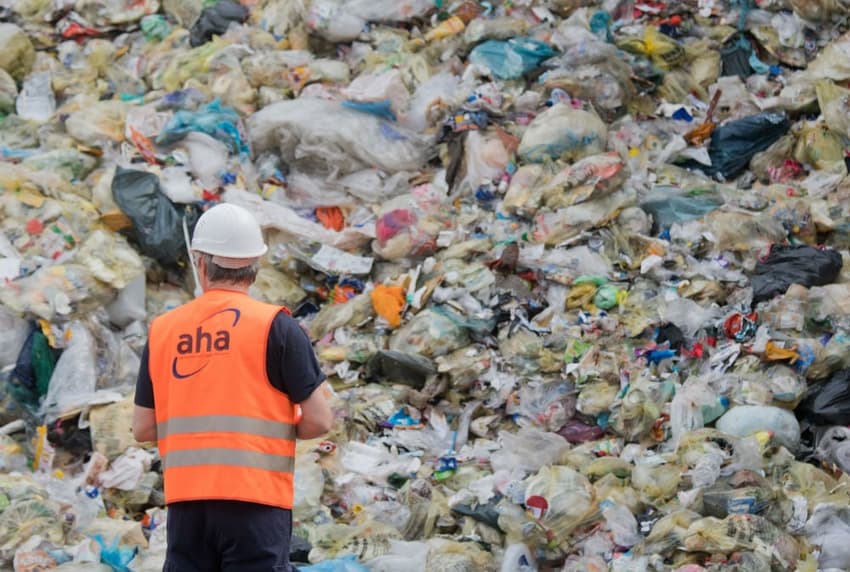All mixed up: 60 percent of plastic waste in Germany lands in wrong bin

Despite a large majority of German households keeping their waste separated, many residents are now seemingly reluctant to do so.
Incorrect waste separation is becoming a problem for the German waste disposal and recycling industry.
In 2017, between 40 and 60 percent of plastic waste alone was thrown into the wrong bin, according to estimates by the Federal Association of Secondary Raw Materials (BVSE).
Quotas for waste in the form of paper and old textiles fare better at between 1 and 10 percent landing in the wrong bin, says BVSE spokeswoman Michaela Ziss.
The association distinguishes between two types of common misconduct among household residents: a “regular miss” and an “intelligent miss”.
If packaging lands in the organic waste bin with slightly mouldy quark or garden waste in a plastic bag, the BVSE calls this a "regular miss" and it is considered bad.
But it isn’t any better than an “intelligent miss,” such as when someone puts a plastic toilet brush in the yellow bin (which is intended exclusively for plastic packaging waste) thinking that they separated waste properly. A toilet brush or toys, even if they are made of plastic, are not meant to be thrown in the yellow bin.
READ ALSO:
-
Recycling-mad Germans turn to sharing to battle waste
-
Nine really beneficial habits you'll pick up living in Germany
According to experts, large German cities in particular have problems with misthrows of organic waste and packaging waste compared to more rural regions and smaller cities.
Often what’s lacking is a basic understanding of the German waste separation system and consistent clarification.
Generally speaking, separate collection containers are available for the following types of waste: plastics, glass, paper, residual waste and organic waste. Locally, though, collection systems can vary.
Increasing migration could also be a reason for the reluctance to dispose of waste properly, a spokesman from the Association of Municipal Enterprises (VKU) said. The German recycling system is not easy for foreigners to understand and must first be explained to them, the spokesman added.
SEE ALSO: 10 mistakes everyone makes when they first arrive in Germany
Another reason could be the fundamental trend that other environmental protection measures are displacing waste separation priorities from the consciousness of residents.
But the incorrect separation of rubbish is not considered an issue for all of those in the waste disposal industry.
"We have not observed an increase in misthrows," said a spokesman for packaging recycling organization Grüne Punkt.
Comments
See Also
Incorrect waste separation is becoming a problem for the German waste disposal and recycling industry.
In 2017, between 40 and 60 percent of plastic waste alone was thrown into the wrong bin, according to estimates by the Federal Association of Secondary Raw Materials (BVSE).
Quotas for waste in the form of paper and old textiles fare better at between 1 and 10 percent landing in the wrong bin, says BVSE spokeswoman Michaela Ziss.
The association distinguishes between two types of common misconduct among household residents: a “regular miss” and an “intelligent miss”.
If packaging lands in the organic waste bin with slightly mouldy quark or garden waste in a plastic bag, the BVSE calls this a "regular miss" and it is considered bad.
But it isn’t any better than an “intelligent miss,” such as when someone puts a plastic toilet brush in the yellow bin (which is intended exclusively for plastic packaging waste) thinking that they separated waste properly. A toilet brush or toys, even if they are made of plastic, are not meant to be thrown in the yellow bin.
READ ALSO:
- Recycling-mad Germans turn to sharing to battle waste
- Nine really beneficial habits you'll pick up living in Germany
According to experts, large German cities in particular have problems with misthrows of organic waste and packaging waste compared to more rural regions and smaller cities.
Often what’s lacking is a basic understanding of the German waste separation system and consistent clarification.
Generally speaking, separate collection containers are available for the following types of waste: plastics, glass, paper, residual waste and organic waste. Locally, though, collection systems can vary.
Increasing migration could also be a reason for the reluctance to dispose of waste properly, a spokesman from the Association of Municipal Enterprises (VKU) said. The German recycling system is not easy for foreigners to understand and must first be explained to them, the spokesman added.
SEE ALSO: 10 mistakes everyone makes when they first arrive in Germany
Another reason could be the fundamental trend that other environmental protection measures are displacing waste separation priorities from the consciousness of residents.
But the incorrect separation of rubbish is not considered an issue for all of those in the waste disposal industry.
"We have not observed an increase in misthrows," said a spokesman for packaging recycling organization Grüne Punkt.

Join the conversation in our comments section below. Share your own views and experience and if you have a question or suggestion for our journalists then email us at [email protected].
Please keep comments civil, constructive and on topic – and make sure to read our terms of use before getting involved.
Please log in here to leave a comment.